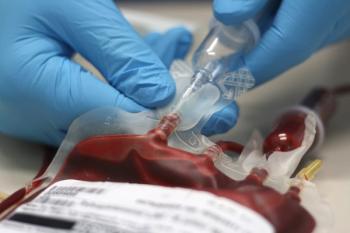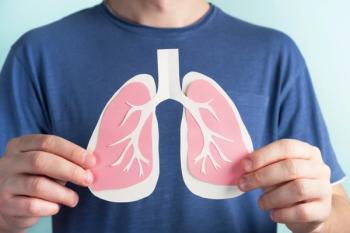
Findings from a retrospective study suggested a possible causal relationship between prior infection and the development of hypersomnolence disorders such as narcolepsy and idiopathic hypersomnia, but more research is needed.

Findings from a retrospective study suggested a possible causal relationship between prior infection and the development of hypersomnolence disorders such as narcolepsy and idiopathic hypersomnia, but more research is needed.

A new report builds on previous research that could help scientists better understand type 1 diabetes (T1D) risk.

According to new research from Jordan, patients with both heart failure (HF) and diabetes had a higher prevalence of HF with preserved ejection fraction (HFpEF), elevated cholesterol, low-density lipoprotein, and impaired kidney function.

An analysis of 2 phase 3 trials supporting the use of pegcetacoplan (PEG) in the treatment of paroxysmal nocturnal hemoglobinuria (PNH) assessed the benefits of this treatment compared with eculizumab (ECU) and supportive care measures.

Scientists are worried that fertilized hen eggs remain the main ingredient for the H5N1 bird flu vaccine; an increased risk of preterm delivery and stillbirth exists in the US due to the worsening climate; health care executives are discussing whether they should bring in outside consultants or hire more employees in preparation for cyberattacks.

Clinical use of liquid biopsies to determine the likelihood of CRC is the goal based on its effectiveness in recent studies.

Recent studies reveal that simoctocog alfa (Nuwiq) offers effective prophylaxis and treatment for severe hemophilia A in children, with low inhibitor rates and strong long-term safety and efficacy.

A study using a large Korean health database found that people with a rare hair loss disorder called primary cicatricial alopecia were more likely to also have additional health problems like diabetes and high blood pressure compared with people who had other hair loss conditions or no hair loss at all.

Posters presented at the American Thoracic Society (ATS) 2024 International Conference examined factors of the pandemic that may have influenced the clinical presentation and diagnosis of respiratory symptoms, as well as health care resource utilization for serious asthma outcomes.

Exercise and dietary interventions reduced fatigue and improved both fat-free mass and physical functioning in patients with ovarian cancer (OC), but no significant differences in improvement were found between the intervention and control groups.

Amy Shapiro, MD, medical director, Indiana Hemophilia and Thrombosis Center, discusses the clinical trials that influenced plasminogen's (Ryplazim; Kedrion Biopharma) FDA approval, as well as details valuable information for the treatment of patients with plasminogen deficiency.

Expert speakers at the American Thoracic Society (ATS) 2024 international conference share their favorite parts of the event and the key takeaways they will leave the conference with.

Experts warn of insufficient support for patients amid surge in prescriptions for weight loss; new Florida law will allow C-sections in clinics; focus shifts to amending international health regulations for pandemic preparedness.

Among the many topics discussed at the American Thoracic Society 2024 International Conference (ATS 2024), the majority touched on barriers to health equity and access, regardless of the key focus of each talk or study. Experts examined this within the field, emphasizing the importance of enhancing data diversity, modernizing diagnostic tools, and revising regulatory standards to promote equitable health outcomes for diverse populations.

MicroRNAs could be a key to future testing for colorectal cancer (CRC) and determining treatment.

Cardiovascular disease (CVD) risk was reduced by 1.2% in the intention-to-treat analysis and 5% in the per protocol analysis for adults aged 75 and older.

A case study details the cytological and histological features of fibrin-assisted diffuse large B-cell lymphoma in a patient with no clinical symptoms, highlighting the diagnostic challenges of this condition.

A study found that prehospital blood pressure (BP) reduction had no impact on functional outcomes among patients with undifferentiated acute stroke, but that it may decrease the odds of poor outcomes following hemorrhagic stroke.

Myasthenic crisis has been estimated to occur in up to 30% of patients with myasthenia gravis after thymectomy.

Interim results of the randomized, phase 3 PhALLCON trial indicate ponatinib’s benefit over imatinib in frontline treatment of Philadelphia chromosome–positive acute lymphoblastic leukemia (Ph+ ALL), but questions linger about ponatinib’s long-term safety.

A retrospective study of over 100 pediatric and adolescent patients showed that providing virtual training for insulin pump use was both safe and effective.

The Center on Health Equity & Access offered novel insights on transgender health and pulmonary medicine with late-breaking data and expert interviews from the American Thoracic Society annual meeting.

However, investigators said there is some evidence suggesting attention-deficit/hyperactivity disorder may be more common in certain age groups of children with hemophilia.

For this analysis of how body composition might affect the impact of immunotherapy used to treat non–small cell lung cancer (NSCLC), investigators from Dana-Farber Brigham Cancer Center compared patient outcomes based on baseline body composition measurements or first follow-up scan.

In the final part of our interview with Binod Dhakal, MD, lead investigator of the CARTITUDE-4 study, he looks to the future of earlier treatment for relapsed/refractory multiple myeloma.

Men who have sex with men (MSM) who have HIV and were in a marriage of convenience were found to have an increased risk of experiencing intimate partner violence.

Many US dairy farms have not yet increased bird flu protections for employees despite the outbreak in cows; the human papillomavirus (HPV) vaccine is linked to a drastic reduction in head and neck cancers in adolescent boys and men; the World Health Organization recently accused tobacco companies of actively trying to hook a new generation on nicotine.

An Italian review highlighted the potential of AI to enhance early diagnosis and treatment of hidradenitis suppurativa, though challenges such as data privacy, algorithm bias, and interpretability must be addressed to fully leverage AI's benefits in dermatology.

Patients who took the weekly glucagon-like peptide 1 (GLP-1) receptor agonist were 21% less likely to experience major kidney disease events and 29% less likely to die due to cardiovascular causes.

Prophylactic intravenous immunoglobulin reduces COVID-19 infection rates in older patients with DLBCL with hypogammaglobulinemia undergoing reduced-intensity R-CHOP therapy.

259 Prospect Plains Rd, Bldg H
Cranbury, NJ 08512
© 2025 MJH Life Sciences®
All rights reserved.
